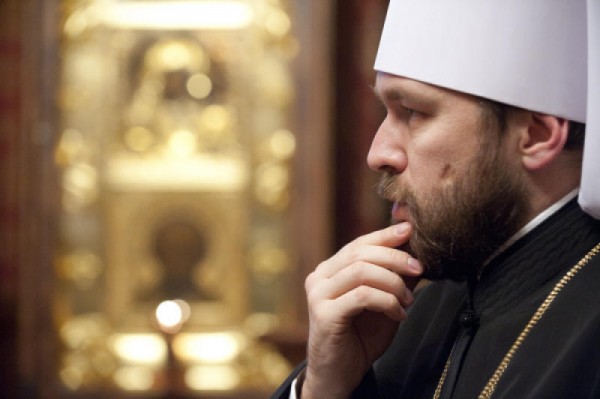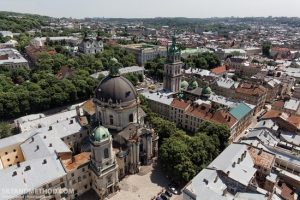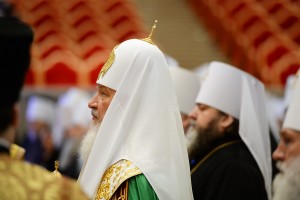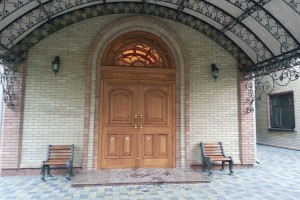Rogatkin: In any war it is civilians who suffer the most. It is evident from the war in Novorossia, Donbas. Schools, hospitals, maternity homes are destroyed. Churches are damaged too, as a church and a belfry tower with its shining cupola is an easy target for a gun layer. One Cossack, who has been building a church with his own hands near Lutugino for twenty years now, told me that for a whole month, Ukrainian artillerymen believed that a militia scout was there on that belfry and kept shelling the church. He says: God has preserved me, no shell hit the target.
But there are churches which have been destroyed to their very foundations. These are not only Orthodox churches. In Pervomaysk, the Baptist church has been almost completely destroyed. In Novosvetlovka, several shells hit the cupola of an Orthodox church. It is being restored now. A monstrous thing happened to that church. It was used first to drive together the people of Novosvetlovka. They were locked in for some time and later, not far from that church, several militiamen were shot to death with no investigation or trial, only because they had arms in their hands. They were taken prisoner, executed and dug in a few meters from the church.
Your Eminence, in this connection, what position should be taken by an Orthodox priest? Does he have to take a particular side? He sees shells flying into his church and wounded militiamen and suffering civilian come to him. What must be his conduct?
Metropolitan Hilarion: An Orthodox priest should identify with those who suffer. The Church is always on the side of those who are subjected to violence and aggression. The Orthodox Church should not take sides in a political or civic confrontation. What do we see in Ukraine now? – The faithful of our Church find themselves on either side of the barricade. This has been the case since the January events.
Rogatkin: It turns out that the Orthodox Church is twice divided? First, it is divided by the Ukrainian schism, as self-proclaimed Patriarch Philaret has led away a part of the flock. Now it is divided by this civil war.
Metropolitan Hilarion: We do not say that the Orthodox Church is divided. As for the schism, we say that some people have separated themselves or fallen away from the Orthodox Church for this or that political reason. Indeed, from the very beginning the Ukrainian schism has been a political project aimed at dividing the Russian and Ukrainian people. More than twenty years ago they divided the Church, more precisely, they divided Christians because, I repeat, we never say that the Church can be divided within itself. We say that some people, groups of people or hierarchs may fall away from the Church.
Today it is the Ukrainian Orthodoxy that is divided. First the people were divided according to a doctrinal principal and then an attempt was made to divide them according to a linguistic and political principle and now this division has led to a civic confrontation victimizing civilians. This is what the most terrible thing is.
The canonical Ukrainian Orthodox Church of the Moscow Patriarchate does not take a particular side in this conflict. She does not say that we are with the Ukrainian Army or we are with the militia or we are with this or that political force. The Church should be above political fight, on the one hand, and together with those who suffer, with the victims, on the other.
Rogatkin: Do you remember those pictures from Maidan when many Greek Catholic priests took Maidan’s side? They came forward with crosses and called to storm the Berkut riot squad. It was so.
Metropolitan Hilarion: From the very beginning the Greek Catholic Church helped develop this conflict, for it identified with one of the conflicting parties. I spoke about it openly at the Synod of Catholic Bishops in Rome, in the presence of Pope Francis. After that, all the Catholic mass media, especially in America, most of all Greek Catholic, hulled me. Though I stated a very simple thing that the Church is not created to participate in political struggle. The Church cannot and must not take sides in a conflict because by doing so we, first, help kindle up this conflict and, secondly, we as if marginalize people regardless of their number – the people who belong to our Church but can take an alternative political stand. The Church in general should not have any political position.
Rogatkin: But it is precisely a political conflict. If we recall the capture of churches which belong to the Moscow Patriarchate, they were captured under the banners of the Svoboda (Freedom) Party. They were captured either for the Philaretians or, again, for the Greek Catholic Church. What we saw in Maidan is not new at all. It has been happening for twenty years. With cries: Muscovites to be hanged, they knocked out the doors of Orthodox churches and dragged out priests. One priest in western Ukraine told me that they used chains. He himself sat almost enchained for several days. Another priest from Rovno told me that in the 90s when he was 12, his church was captured and his father was strongly hit on the head. He heard then saying: What shall we do with the parson’s offspring? Let us hang him; otherwise when he grows up he will turn into a Moscow parson. And he, when a child, did not know where Moscow was?
Metropolitan Hilarion: Paradoxically, the Ukrainian Greek Catholic Church, whose head is in Rome, now positions itself as Ukraine’s national church. The Ukrainian Orthodox Church of the Moscow Patriarchate, which unites the majority of Orthodox believers in Ukraine, is positioned in the nationalistic mass media and propaganda as a Church governed from Moscow. It means that a Church can be governed from Rome but cannot be governed from Moscow.
Actually, the Ukrainian Orthodox Church is fully independent. The Patriarch of Moscow does not govern the Ukrainian Church; it is not accountable to him either financially or administratively. Only the devotional relation is preserved. We are ready to help for instance when, God willing, the restoration of churches will begin in Donbas. We will certainly help in all possible ways. But it has nothing to do with the internal financial life of the Ukrainian Church. In this respect, it is fully independent. In the Ukrainian Church, bishops are elected on its own with nominations not to be approved in Moscow. Only when the Metropolitan of Kiev is elected by the Ukrainian episcopate, his election is to be approved by the Patriarch of Moscow. But is rather spiritual than any other bond.
We cherish this relationship because the point here is the spiritual unity which is over a thousand years old, coming from the baptismal font of the holy Prince Vladimir. This year we will mark the millennium of the demise of the holy Prince Vladimir. And in 2013 we celebrated the 1025th anniversary of the Baptism of Rus’.
Once it was united Rus’. For the last thousand years, new political boundaries developed more than once but it does not mean that the Church, every time some new boundaries develop, should be divided into smaller parts. If we had done it then in Africa there would not have been a singe Patriarchate of Alexandria but 54 dwarfish Orthodox Churches. And the Patriarchate of Antioch, which united the faithful in Syria and Lebanon, would have been divided as well.
The Church unites people not on ethnic grounds. We cherish the unity which, especially today, manifests its relevance, soundness and importance. When politicians divide a society into warring parties, when the military eliminate people, the Church seeks to unite and reconcile all.
Rogatkin: Notably, the Ukrainian religious field is rather mixed. There are so many all kinds of sects, so many preachers who bring in some crazy ideas. They enjoy respect, while the Russian Orthodox Church of the Moscow Patriarchate keeps aloof. It is hated and mistreated actually by all. It is politics, nothing else.
Metropolitan Hilarion: Because the Russian Orthodox Church becomes a victim of propaganda and political struggle and, in the zone of hostilities, also a victim of the military conflict. You have given some examples. We have information which, regrettably, keeps replenishing with new reports: 3 priests of the Ukrainian Orthodox Church are killed; 62 churches in Donbas are damaged, with some destroyed completely, other destroyed substantially, still other partially and need restoration. All this supports what you have said: there is a purposeful struggle against the canonical Church; the Church is under attack.
Really, churches become easy targets. It is a great tragedy which is unfolding today before our eyes. And we cannot take it as a contingency. If there is massed artillery shelling, churches may be hit accidentally. But if we see so many churches destroyed completely or partially, it means a purposeful campaign. We cannot see it differently.
Rogatkin: Considering the fact that people there are believers. When Ukrainian paratroopers left the Lugansk airport, the militia showed us all they left after them. Together with packed lunches there lay hips of Greek Catholic books. There were also the Gospels and the Bibles, that is, it had all been parachuted specially for them.
Metropolitan Hilarion: When I openly state that the Greek Catholics have taken one side of the conflict, that they stood behind the events in Maidan, when they were brought by buses from western Ukraine to kindle up inter-ethnic hostility, then they give this answer to all this: ‘No, it is not a political confrontation. In this way we expressed our civic position’. This is the answer given by representatives of the Greek Catholic Church. We are not at all happy with their answer. Indeed, if the Church is called to reconcile people it means that we should be with all those who suffer; we should not take a particular side; we should not say: This people are ours and those people are not.
Rogatkin: Your Eminence, how matters stand with the Pochaev Laura? It is one of the most significant shrines of the Russian Orthodox Church in western Ukraine. I remember how in February, just a week before the events in Maidan, they came to break the gates to the Pochaev Laura. How the matters stand there now?
Metropolitan Hilarion: There were such attempts, but the Pochaev Laura stands guard over canonical Orthodoxy. There was an attempt to seize the Kiev Laura of the Caves as well, but these two monasteries keep strong the monastic spirit. The monks are well aware of what the canonical Church is and what the schism is. In its time when the iconoclastic heresy distracted the Church, it was monks who stood up in defence of holy icons. Today, monks stand guard over canonical Orthodoxy. I believe that both the Kiev Laura of the Cave and the Pochaev Laura and other monasteries will stand firm for the faith and canons of the Orthodox Church.
The conduct of monks during the Maidan events can serve as an example. When barricades were erected and an armed confrontation was in preparation, monks of the Tithe Monastery in Kiev came out to stand under a torrential rain between the two warring groups in order to prevent them from a deadly fight. I think such should be the position of the Orthodox Church and Orthodox monastics.
Rogatkin: For the last twenty years, how many churches of the Moscow Patriarchate were taken away or destroyed in this struggle?
Metropolitan Hilarion: If we speak of the parishes which have recently moved to the so-called ‘Patriarchate of Kiev’, according to them there are 30 such parishes, while according to our information, there are 10. But we should realize how this move actually takes place. It is not a voluntary popular will but a move done, as a rule, under very serious pressure.
I will give you an example. Recently a declaration was signed in the Rovno region on the establishment of a single Ukrainian Local Church. It was done under pressure from the local authorities. It was signed, among others, by a bishop of the Ukrainian Church of the Moscow Patriarchate together with a schismatic false bishop and a Uniate bishop. This document immediately gave rise to a lot of questions: Will the Ukrainian Orthodox Church be established within the Rovno region? Or, is the Uniate bishop ready to disobey the Pope in order to join the projected single Ukrainian Orthodox Church?
Rogatkin: That is, not all there still understand what they sign.
Metropolitan Hilarion: They either do not understand or yield to pressure. As a result, very soon the Orthodox bishop withdrew his signature; the Uniate bishop followed suit, while the governor was dismissed. Here is the end of the story for you. In this case, there was a very serious pressure.
As for the popular will, we saw a report about people making rounds with ballot boxes. They come to some babushka who hardly can hear what they say and ask her: Are you Ukrainian? Yes, I am. Are you for Kiev? Yes, I am. Sign the paper. And your relatives, where are they? They are not here. Can you sign for them? Yes, I can. You see, it is simply profanation. As a result, it turns out that parishes of the canonical Church are transferred to these schismatic associations.
It is not a mass process, of course, but single instances. And we should hope that this process will cease. It will cease, first of all, when peace comes back to Ukraine. We pray for it at every Divine Liturgy. And not only the Ukrainian Orthodox Church of the Moscow Patriarchate but the whole multi-national and millions-strong Russian Church prays that peace may return to the land of Ukraine. It is our strongest desire. It is for it that we ask God in the beginning of the new year 2015 so that it may bring us much-desired peace.
DECR Communication Service




















